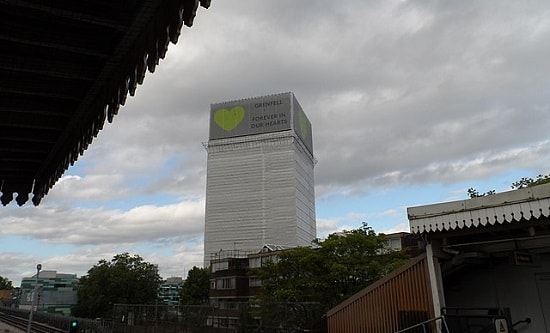
Every week of the inquiry into the Grenfell fire that killed 72 people in 2017 brings more shocking revelations of criminal negligence, incompetence, cronyism and greed. Not one of the plethora of manufacturers, contractors, subcontractors, ‘specialists’, consultants and designers involved in securing a slice of the lucrative multimillion pound refurbishment of the tower emerges with any credit. Not one penny was spent on safeguarding the lives of its working class residents. These criminals did everything to create the disaster short of actually striking a match.
The so-called ‘fire experts’ and architects have already given their woeful testimony (see ‘The Grenfell fire: racism, corruption and greed’ on our website).* In July and September it was the turn of representatives of Rydon, the main contractors with ultimate oversight of the 2014-2016 refurbishment, and their ‘specialist’ subcontractors, Harley Facades. Rydon was basically handed the contract on a plate because its refurbishment director, Stephen Blake, had worked with Peter Maddison of the tenant management company KCTMO in the early 2000s. KCTMO’s own consultants, Artelia, would later say they had never ‘worked with a contractor operating with this level of nonchalance’. Work carried out under Rydon’s watch was, the inquiry heard, of ‘shockingly poor workmanship’. Its site manager, Daniel Osgood, was described by his own boss as a ‘chancer who wanted to do as little as possible’ and the project manager was inexperienced with an ‘inaccurate’ CV suggesting expertise he did not have. The entire team responsible for Grenfell had ‘limited knowledge of building regulations’.
Harley Facades were brought in as specialists to oversee the cladding of the tower – whose combustibility was the key factor in the spread and intensity of the fire. It has emerged that:
- the company’s owner, Ray Bailey, was ‘confused’ by basic fire standards for cladding products, taking it on trust from manufacturers that they were compliant.
- the Grenfell project manager was 25-year-old Ben Bailey, the company owner’s son, whose previous experience of project management consisted of ‘helping out in the school and university holidays’. He failed to act on warnings from the company supplying cavity barriers that the failure to fit them at the top of windows was a serious fire safety weakness. His ‘inspection’ of work missed an entire face of the building where horizontal fire barriers had been fitted vertically.
- Insulation manufacturer Celotex wanted to use Grenfell as a guinea pig for the use of its newly-branded polyisocyanurate foam on tall buildings, and offered a 50% discount. Ben Bailey admitted he only considered evidence of its thermal qualities, not its fire safety. The foam – which releases a toxic gas when burned – had never been tested in combination with the type of cladding used at Grenfell. When ignited, the combined materials fuelled a fire that burned at more than 1,000C and spread up the 24-storey tower within minutes.
- Harley employee Mark Harris deliberately pushed for Reynobond PE 55 cladding to be used, an aluminium composite material (ACM) that burns like petrol. When Harris told Arconic, (which manufactured the Reynobond range) and CEP (which cut the panels to size) that they had won the contract, he received emails ‘thanking him for his perserverance’ and promising him ‘a nice meal somewhere very soon’.
- Harley paid £200,000 less for the cladding panels than it had quoted and simply pocketed the difference.
- At the time of the Grenfell refurbishment, Harley did not have anyone on its staff with a qualification in facade engineering.
This appalling catalogue of errors, corner cutting and greed shows indifference not just for the lives of the residents of Grenfell Tower, but towards any kind of standards or ethics whatsoever when it comes to housing for the working class. The wholesale dilution of building and fire safety standards mean there is the potential for more Grenfells in high-rise blocks across the country. Criminals like Rydon are still being handed contracts by local authorities. In September, the government voted down an amendment to the Fire Safety Bill which would have incorporated many of the recommendations that emerged from the first phase of the Grenfell Inquiry. This contempt for the working class will cost more lives.
Cat Wiener




